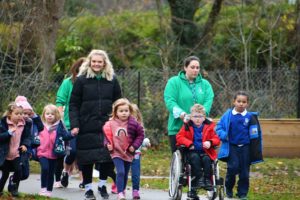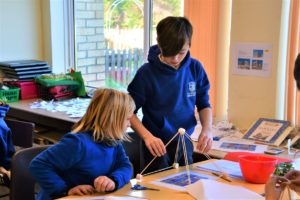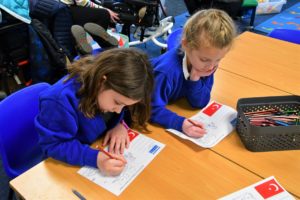 Gilwern Primary School
Gilwern Primary School
Planned strategically over short, medium and longer terms
Information about the school

Gilwern Primary School, an English medium school, is based near Abergavenny in Monmouthshire and caters for pupils aged between four and 11 years of age. The school has over 210 pupils on roll and 27 members of staff. It is a Pioneer for Professional Learning school and a Lead Network School for Science.
Approach taken
A whole school vision has been central to the ethos at Gilwern for a number of years, having been developed originally in collaboration with all stakeholders (learners, staff, governors and parents/carers). The headteacher places high value on involving the whole community in creating and owning a vision that provides a clear direction for learners, staff, governors and parents/carers. The vision has recently been reviewed to ensure that it has the four purposes at its core, in readiness for the new curriculum. Three core vision statements are as follows:
- Gilwern School creates a happy, secure and stimulating environment, where learners are encouraged to reach their full potential.
- The school works effectively with others and plays a central role in the community.
- All staff are committed to continuous improvement and achievement of high standards.
Alongside these statements, the school adopted the strap line ‘nurture, empower and achieve’.
Leaders believe firmly that it has been important to ‘stay true’ to the original vision and to resist becoming distracted by new initiatives which are not aligned to that vision. It has also been important that school leaders regularly review whether the school is achieving the vision and take appropriate action where necessary.
Professional learning plans aligned to school improvement objectives
The school vision guides the way in which professional learning is led at Gilwern. The headteacher works closely with two deputy headteachers to align professional learning to the school development plan (SDP), whilst also ensuring that the approach taken caters for departmental and individual practitioners’ needs (identified using the Professional Teaching and Learning Standards). The deputy headteachers facilitate professional learning across the school and also contribute at a cluster and national level, thus also bringing wider perspectives to bear at Gilwern.
The senior leadership team sees its role as ‘putting the scaffolding in place’ to allow practitioners to take ownership of their own professional learning and to prepare for the delivery of the new curriculum. This involves creating a culture where practitioners are ‘empowered and motivated to become better at their jobs’, are encouraged to focus on pedagogical processes rather than outcomes alone and where they play to their strengths to support pupils and colleagues.
The importance of investing in the skills and well-being of staff is emphasised and practitioners at all levels are encouraged and empowered to engage in on-going professional learning as a means of achieving high standards.
Professional learning plans creating a rhythm of opportunities & support
A key aspect of professional learning at Gilwern has been to allow staff time to discuss, evaluate and challenge the purpose of their teaching – in essence, to ask the question ‘why?’. This has allowed staff to a deeper understanding of excellence in community education and reaffirmed what the school seeks to achieve as a learning organisation.
Leaders seek to create an appetite among practitioners to research, try and reflect upon new approaches. Considerable emphasis has been put upon ‘pupil led learning’ in recent times, with teachers given greater freedom to flex timetables and respond to pupils’ interests (within an overarching framework). School leaders believe that pupil initiated learning is central to bringing about intrinsic motivation within the new Curriculum for Wales. Practitioners are empowered to engage with learner interests whilst promoting independent dispositions and harnessing rich authentic contexts whilst also providing a platform to exercise literacy, numeracy and digital skills. The leadership team encourages and supports staff to trial and reflect on new pedagogical approaches through purposeful critical collaborative professional enquiry (CCPE). This has allowed staff to take small steps to facilitate the four purposes throughout the learning experiences and to ensure that pedagogy is purposeful and aligned to the whole-school vision.
All staff are encouraged to develop professional networks and engage in purposeful professional dialogue both across phases within the school and with a variety of practitioners outside the school. Such engagement provides a platform for collaboration and engagement in innovative pedagogy.
The headteacher also perceives that he has a duty to develop the capacity of leaders at all levels within the school and to use individual leaders’ talents to best effect. He seeks to offer constructive challenge and to look at developments within the school from the perspective of all stakeholders, including learners, parents and governors.


Professional learning plans appropriately resourced (human, financial & time)
Through clear vision and strong leadership a culture of collaboration has developed over time. Staff are given time to reflect and share their continuous learning, both within and outside the school.
Support staff are allocated non-contact professional learning time on a fortnightly basis. To date these ‘sessions’ have been facilitated by school leaders but with time, the expectation is that support staff will become equipped to identify and lead their own learning as a self-directed group.
There has been a notable shift in culture within the school: professional learning is no longer seen as an activity directed by school leaders but rather as one where practitioners engage proactively in identifying their own professional learning needs and in determining how to go about honing their skills. All staff are aware of how their professional learning feeds into whole school development, how it maintains high standards and how it contributes to realising the whole school vision.
Whilst some use is made of standalone training courses, these have become a far less pronounced feature of the way in which practitioners learn.
The leadership team recognises that change takes time, however and whilst investment in school staff has helped to engender new levels of understanding, to build mutual trust and develop the school’s underpinning ethos and culture, the school’s journey is essentially a continuous one.

